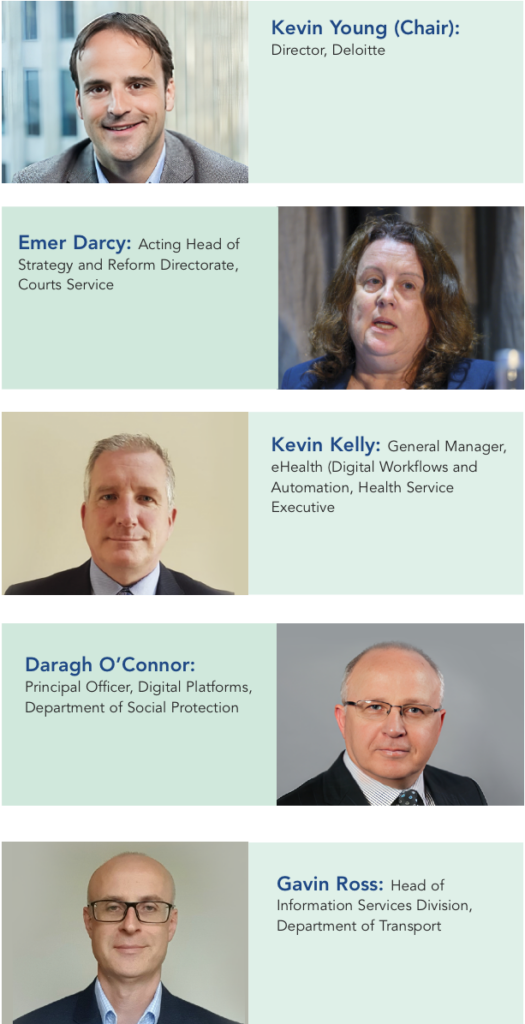Innovation in public services

Experts from across the public sector offer their perspectives on how best innovation can enhance public services in Ireland.
What are the key challenges facing the public sector?
Kevin Kelly (KK): Attracting the right talent and then retaining them for ourselves. The private sector companies we are competing with are paying fortunes, so we are having to think a little bit differently, and we are looking at using apprenticeship models, internships, and we are getting some really good people through that.
Gavin Ross (GR): Hybrid and remote working is a topic which has been to the fore over the last number of years, but I feel that we have not cracked it yet. There is a lot of technology that can enable more remote working and I think that is an exciting area which we can look at.
Emer Darcy (ED): Breaking out of siloes; this is something which is a challenge which people in all parts of the public service have grappled with but are starting to make progress and the direction of travel has been set. We all share the sense of public service which motivates us to do our jobs, and this will be a game-changer.
Daragh O’Connor (DO’C): There is a lot being moved on at the moment and if you introduce these things too quickly then there is always a risk that comes with the quality of the final work. In the Department of Social Protection, we have introduced a creation kit which has all of the modules and all the core designs that we have come up with. This gives us a bit more pace in the development, but it also improves the testing and therefore the quality.

How is your organisation approaching innovation?
GR: We moved away from a managed desktop platform from the OGCIO. The reason we did was partially because of a security element but also because it would allow us to be less reactive to external events and more proactive in our own agenda. We have done a lot with robotic process automation [RPA]; with the war in Ukraine there was a huge spike in fuel costs and there was a real need to roll out support to the whole industry. With the RPA platform in place, we were able to deliver that platform and that scheme very quickly.
DO’C: We in the Department of Social Protection have taken a ground up approach to innovation. There are 177 projects that are led from small ideas or big ideas in various parts of the Department. There is a structure in place and at the top of that structure there is an assistant secretary who is watching it, and they ensure that it gets funding and resources.
KK: The most important thing is managed risk-taking. Around 2019, with some funding from DPER, we commenced two pilots in RPA at the end of 2019 which were functional at the end of February 2020. Little did we realise that one of these was to be instrumental during the pandemic response in Garda recruitment. Our robots were able to make the recruitment process 52-times quicker. The impact of that was that hiring managers were able to have people in place within a week, rather than a month as had been the case previously. This switch was hugely important right through 2020.
ED: There are lots of innovations happening which are coming from our staff. We have a network of innovation advocates within the organisation. We developed our innovation strategy for which we were part of the pilot for the toolkit. We are trying to really get that people-centric focus in terms of that service delivery. The modernisation programme is dealing with the online.
What excites you most about the future of public services?
GR: The AI tools that are coming through. If chatbots can be improved and simplified with their answers that can be brilliant. This is still in its infancy and that all has to be worked out. Within time, though, we will have a model which can be trusted, and this will give our staff a better means of working in a simplified way.
DO’C: I am convinced that technology can help us deliver public services better. If you can tie down the data source that the AI is looking at, it would go a long way to tie down concerns which exist in these technologies’ present forms.
KK: Staffing; in the last two years it has been incredibly tough in the area that we are in, but coming out of that I have perceived a sense of a reminder in the importance of the work we are doing. Staff are ready to innovate, and the sense of public duty is really at the core of our work.
ED: Public service value which can be extracted from enhanced services. We can all make a difference to people’s lives no matter where we work in the public sector. The most exciting thing is that this is something which is in front of us and is tangible. Those building blocks are now in place. We have the design principles that we are talking about. We are pushing past boundaries which will allow us to work on and deliver for the people that we are working for.





